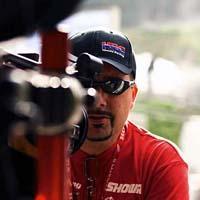
Recently on Cyclingnews.com |
MTB index page for all MTB content
An interview with Martin Whiteley, February 5, 2009
Behind the scenes of mountain bike management
Former downhill racer and UCI official Martin Whiteley takes a look at future of mountain biking. Mountain Biking UK goes behind the scenes at Whiteley's 23 Degrees Sports Management company, a successful business venture that has represented athletes like reigning World Cup champion and former World Champion downhiller Greg Minnaar. For 2009, 23 Degrees is backing the Trek World Cup team. 23 Degrees' previous teams, which have won World Cup titles, include Global Racing and the more recent Team G Cross Honda.

|
Mountain Biking UK: What is 23 Degrees Sports Management?
Martin Whiteley: We're a secretariat for the riders. We handle sponsorship contracts, special invites to promotional races and events, help with their interviews and look after websites, as well as working on their media profile in many national markets. I speak four languages so that helps with contacts overseas. We also advise on other issues like race season strategies, off-bike professionalism and so on.
MBUK: What's with the number 23?
MW: That could take up the entire interview, but if anyone's seen the movie Number 23 with Jim Carrey, it's kind of like that but with a little less mania. It's a number that's been ever present in my life, maybe through coincidence or whatever - but it became my race number, then a nickname. It seemed logical to name my company after the fact that the world does actually spin on an axis of 23 degrees. There's a lot more to it, but that's for another day.
MBUK: Why sports management?
MW: I was always a lot better at admin than I was at racing downhill, and I found that most top-level downhill racers are way better at racing than handling admin! It looked the perfect way for me to continue working in a sport I live for, and to help riders I really respect.
MBUK: What do you look for in an athlete?
MW: A combination of skill on the bike, their attitude and actions off the bike and at parties. I'm not keen to manage someone I've got to get out on bail every three weeks. When I go to sponsors with my list of athletes, I want to believe in each and every one of them, and know that they represent 23D and their sponsors in a professional way. Riding style is important for me, but more important is their ability to grow as a professional rider in all areas, not just results.
"I'm not keen to manage someone I've got to get out on bail every three weeks. When I go to sponsors with my list of athletes, I want to believe in each and every one of them..."-Martin Whiteley says his riders have to have more than just good results.. |
MBUK: Do athletes approach you, or are you a headhunter?
MW: There are always athletes reaching out to us, but riders are usually on my radar for a year before I make contact. I've only once signed an athlete who came to me.
MBUK: Have you ever had reservations about the riders you manage?
MW: Sure, that's not unusual, but more in the sense that I have reservations about them not reaching their potential - there's always a risk of them getting distracted along the way. You do have to be mindful of what other factors are playing out in their personal lives.
MBUK: How do mountain biking athletes compare to other sports on a professional basis?
MW: There's not a huge difference. I've hung around racing drivers and Moto GP riders, as well as road cyclists, and they all have pretty much the same issue of trying to make the most of their window in the limelight without making personal compromises on who they are and what they stand for.
MBUK: What are your views on downhill mountain biking not being in the Olympic games?
MW: I still don't think that having cross counry in the Olympics has radically changed the face of the sport yet - it's still seen as a "lesser" discipline than road cycling, although it does bring in more government and National Federation support, as well as media and sponsor attention one year in four.
The single biggest issue downhill or 4X has for inclusion in the Games is that they need other cycling disciplines to go off the program in order to make way for it. The UCI gets allocated a predetermined quota of athletes by the IOC (International Olympic Committee)… let's say that's 540.
That's made up of road, track, MTB and now BMX athletes. If you want to add 50 downhill riders, you need to subtract 50 track, road or BMX riders. Not an easy task. I think the IOC looks at events like the X-Games and sees that in order to be relevant to a new audience, it doesn't hurt to have snowboarding, BMX and so on in their Olympic programs, so if the opportunity to include downhill comes along, we should take it… but not count on it.

|
MBUK: For riders at a base level, can you advise on how they can advance? It's not a chicken and egg scenario. Sponsorship comes after results, which come after dedication, investment and raw talent that we don't all have. If an athlete has the talent, and some understanding parents, then it's up to the rider. If they have it, they'll get noticed and picked up.
MW: They need to stay true to who they are, but also learn how to improve their communication skills - both with media and potential sponsors.
For the most part, remember that it's a very exclusive club and only a select few have the whole package. Downhill riding is still heaps of fun, and should be enjoyed first and foremost - don't give up the sport just because someone isn't throwing bikes and cheques at you after your first race season.
MBUK: how important is it for us to look "outside" the industry for it to keep progressing?
MW: It's absolutely vital. Without investment from external companies and dollars new to our industry, we're just spending the money our fans and industry consumers spend on our bike company sponsors. It can become a stagnant pool which isn't healthy.
MBUK: Would you say working with Greg Minnaar is your biggest success?
MW: Success? It has certainly been very rewarding on a personal and professional level. I think Greg has created most of his success though - I've just been a guide along the way. To be still working together as closely as we do, in our 12th season, is a form of success, yes.
Having Honda come along and participate in the World Cup was a big deal for me too, but I think my biggest success is keeping a small company afloat for eight years despite economic downturns and huge currency fluctuations… any small company owner will tell you that!
MBUK: Who's the next big thing?
There are just so many names: Josh Bryceland (Great Britain), Aaron Gwin (United States of America), Luke Strobel (United States of America), Arran Gannicott (Great Britain), Joe Smith (Great Britain), Dennis Dertell (Sweden), Sam Dale (Great Britain), Stevie Smith (Canada), Remy Thirion (France), Aari Barrett (New Zealand), Brook MacDonald (New Zealand). A lot depends on their personalities. I only know half of these riders personally though…
Recent articles:
Trek & 23 Degrees partner
for new team in 2009
Trek and Volkswagen end 13-year
cycling partnership
Something big on the way from Trek?
Jakob Fuglsang:
Switching sides
